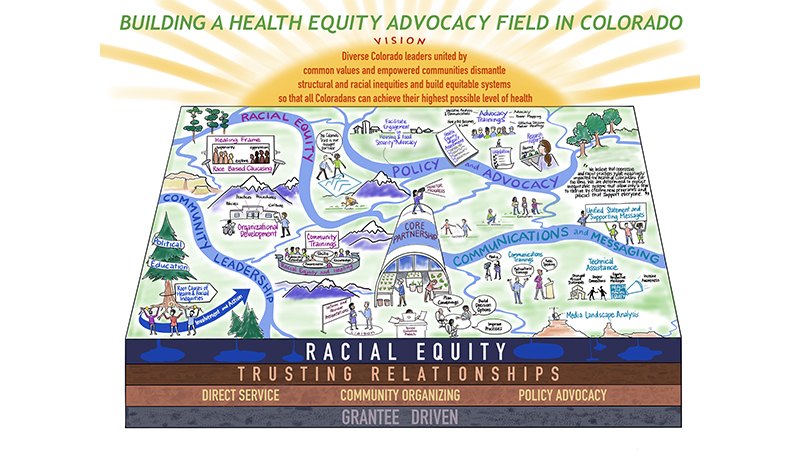What a New Field Can Yield
Leer en español
This illustration shows the vision towards which Health Equity Advocacy grantees are working, the streams of work they have carried out over the past three years, and the foundation upon which their work is based. (Click here for larger image) Illustration by Kriss Wittman, Wittman Studios
By Felisa Gonzales, PhD and Noelle Dorward
Through the Health Equity Advocacy (HEA) funding strategy, The Colorado Trust supported a grantee-driven effort to build and strengthen a field of advocates who could promote health equity policy solutions in changing political environments. The current context of the disparities emerging from the COVID-19 pandemic, the protests against police brutality across the country, and widespread economic uncertainty makes clear the need for (and importance of) a nimble, prepared field of health equity advocates, poised to address systemic injustice through policy change.
A new evaluation brief titled Toward Health Equity in Colorado: Leveraging Collective Capacity for Health Equity Advocacy Field Building, authored by Social Policy Research Associates, details how a cohort of 18 policy advocacy, community organizing, and direct service organizations have worked together over the past three years to nurture a field capable of dismantling structural and racial inequities, and building equitable systems that allow all Coloradans to achieve their highest possible level of health.
The field-building efforts of the HEA Cohort, and the relationships that have been built as they were carried out, have contributed to an evolving health equity advocacy field in Colorado that is growing in size, strength and power. The HEA Cohort organizations have emerged as leaders and anchors within this field.
HEA Cohort members, as well as consultants they selected and hired, provided numerous capacity-building activities in four key domains. These activities promoted health equity advocacy among the Cohort members, their partners and their communities. Examples of the activities include:
- Communications and messaging: Adopted a unified statement and messaging around health equity as well as provided communications workshops, trainings and consultation for Cohort member organizations that served to advance a field-level vision for health equity advocacy.
- Community leadership: Provided 11 political education sessions to help approximately 270 Cohort and community members understand and identify root causes of health and racial inequities, and ultimately bolster community-led change.
- Policy and advocacy: Conducted 12 legislative advocacy trainings attended by approximately 130 Cohort and community members across the state, and developed tools to support policy advocacy engagement at multiple levels. This alignment helped support passage of five of the six bills prioritized by the HEA Cohort in the 2019 legislative session.
- Racial equity: Provided or sponsored race-based caucusing for individuals, coaching on organizational transformation for equity, and 40 community conversations and racial equity trainings for nearly 1,000 people in nine different communities. These increased the field’s collective capacity for promoting health and racial equity through local, regional and state policies.
Additionally, through a network-partner grant strategy, the HEA Cohort also diversified the field by awarding just over $1 million to 59 organizations. Cohort members and their partners in the field have developed trusting relationships and strong capacities that are being leveraged to promote health equity policy solutions to many of the systemic injustices and racial and health inequities our society faces today.
We invite you to read the evaluation brief to learn more about the tremendous field-building work of the HEA Cohort over the past three years. A longer evaluation report—which goes into greater depth on the field-building strategies and progress within each of five outcome areas—is also available. Please contact Evaluation & Learning Manager Felisa Gonzales, PhD, or Advocacy & Policy Partner Noelle Dorward, to learn more or request the longer evaluation report.
Felisa Gonzales, PhD, MPH
Evaluation & Learning Manager
Noelle Dorward
Advocacy & Policy Partner

